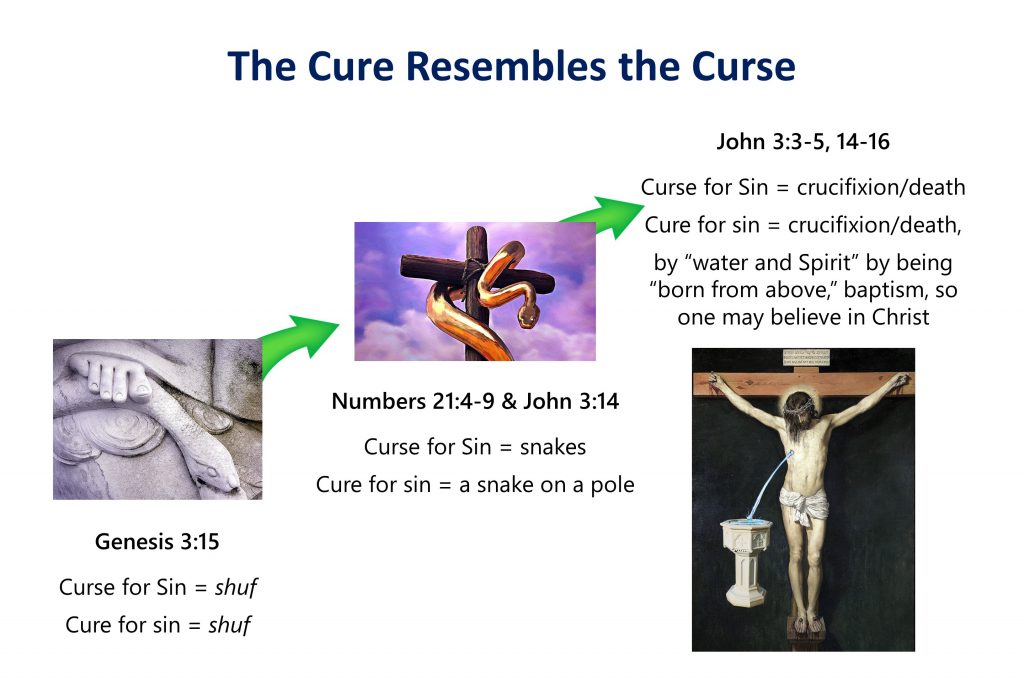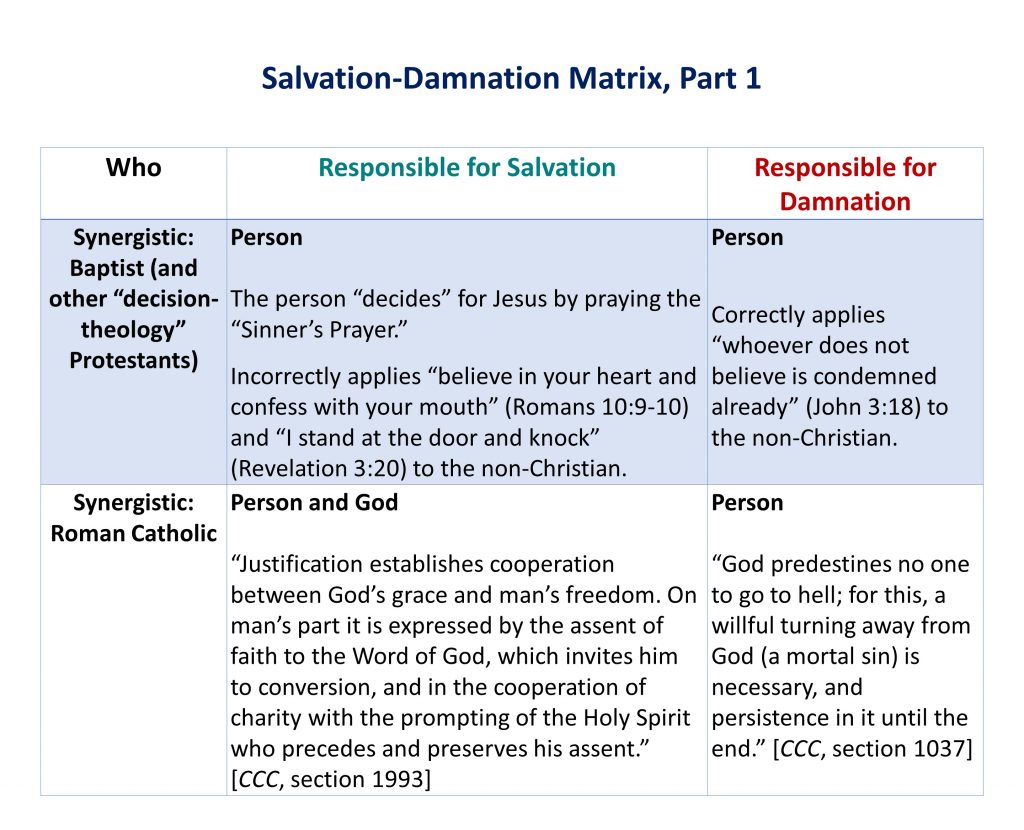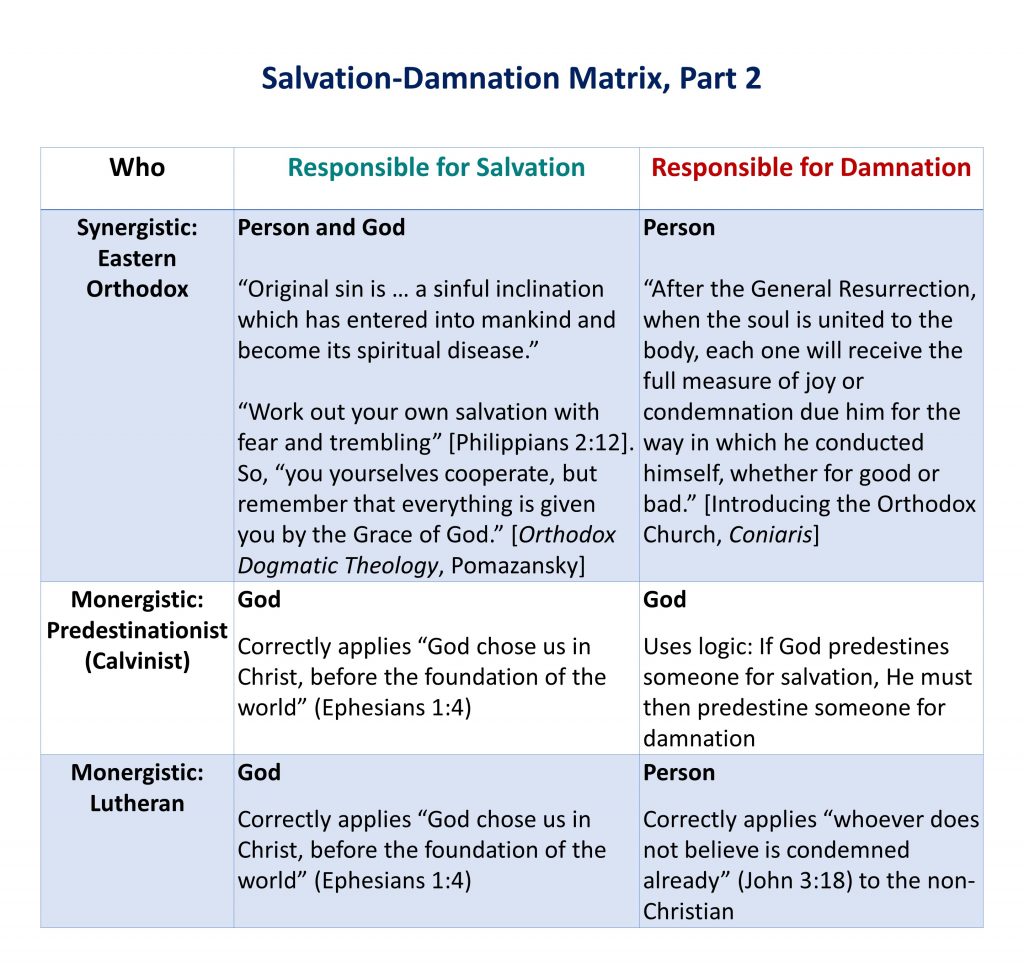In the last Lesson, in “The Parable of the Final Judgment” or “The Parable of the Sheep and the Goats,” many in the class left perplexed. For the parable didn’t answer many of our questions.
The parable did make clear:
- Salvation is 100% God’s doing. “Come, you who are blessed by my Father, inherit the kingdom prepared for you from the foundation of the world” (Matthew 25:34). The parable drives this point home by showing God prepared someone’s salvation before he was ever born. The good works that followed revealed this (Matthew 25:35-36).
- Damnation is not God’s doing: “Depart from me, you cursed, into the eternal fire prepared for the devil and his angels” (Matthew 25:41). God did not predestine anyone to Hell. The lack of good works—in God’s eyes—revealed the person not to be part of His flock (Matthew 25:42-43). “For whatever does not proceed from faith is sin” (Romans 14:23).
The parable did not go further than this, leaving us with many with unanswered questions relating to salvation and damnation.
The Problem and the Prophesied Cure
If God created us, what aren’t all people automatically saved? To understand why we need salvation in the first place, we must explore why.
Read Genesis 3:1-7
- What did both Adam and Eve do, which God commanded them not to do?
Read Genesis 3:11b, 16-18
- What reality now existed for Adam and Eve and their progeny? (vs. 19b)
Read Genesis 3:14-15
- What did God promise to do with the serpent (Satan) and the woman?
- What will take place between the woman’s Offspring and Satan?
In Genesis 3:15, God conveys His first, spoken messianic promise. An Offspring (Hebrew, zera, seed, descendant), a Descendant of Eve, will be born who will crush Satan’s head.
The Hebrew text emphasizes this point by using two homonyms in a wordplay, which sound alike. The first is shuf, in the form y’shufkah, which means to trample or crush. The second shuf is t’shufenu, the “ts” sound being that of a hissing snake before it strikes. By using the same root words and sounds, God lets us realize the cure for sin will resemble the curse.
The Result of the Fall into Sin
Ephesians 2:1, 4-5:
And you were dead in the trespasses and sins … But God, being rich in mercy, because of the great love with which he loved us, even when we were dead in our trespasses, made us alive together with Christ—by grace you have been saved…
- How does Scripture describe our spiritual status before our salvation?
- Can a dead person do anything to change his status?
- How does a person become alive physically? What event needs to take place so he can physically live in this world?
Monergism: God’s grace is the only cause of salvation. People are saved by God’s grace, not by works.
Synergism: People cooperate in their conversion. This developed out of an attempt to reconcile Scripture’s teachings concerning our inborn corruption, God’s all-inclusive redemption, and people being saved by faith. Thus, the person is not by nature spiritually dead but only weakened, so he can in some way “choose God” or cooperate with Him to effect salvation.
Like a person who cannot live until he is physically born, so too do we need a spiritual birth. Jesus pointed forward to this event in a conversation with Nicodemus.
Jesus answered [Nicodemus], “Truly, truly, I say to you, unless one is born again [from above] he cannot see the kingdom of God.” …. Jesus answered, “Truly, truly, I say to you, unless one is born of water and the Spirit, he cannot enter the kingdom of God. That which is born of the flesh is flesh, and that which is born of the Spirit is spirit. Do not marvel that I said to you, ‘You must be born again [from above].’” [John 3:3, 5-7]
In this same conversation, Jesus also pointed forward to His sacrificial death and belief in Him.
As Moses lifted up the serpent in the wilderness, so must the Son of Man be lifted up, that whoever believes in him may have eternal life. For God so loved the world, that he gave his only Son, that whoever believes in him should not perish but have eternal life. For God did not send his Son into the world to condemn the world, but in order that the world might be saved through him. [John 3:14-17]
- Jesus speaks of both baptism and belief, faith, as being necessary. How are they connected?
What is Faith?
Faith: Greek, pistis: A trust, belief, or that which evokes confidence or reliance in something or someone, a conviction. Pistis can also mean someone’s “faithfulness” depending on its usage.
Read Ephesians 2:1, 4-9
- What also is faith? (vs. 8)
- If faith is “the gift of God, not a result of works,” can God give faith to someone based on how He chooses?
Can Infants have Faith?
If faith is a gift from God, then He can choose to whom He gives that gift and how—even to infants. Jesus says unless someone is “born again [from above] he cannot see the kingdom of God.” To be gifted with something and being born are both things that happen to the person.
Luke 18:15-16:
Now they were bringing even infants [brephos, newborn infants] to [Jesus] that he might touch them. And when the disciples saw it, they rebuked them. But Jesus called them to him, saying, “Let the children [paidion, a very young child, an infant] come to me, and do not hinder them, for to such belongs the kingdom of God. Truly, I say to you, whoever does not receive the kingdom of God like [hos, as] a child [paidion, a very young child, an infant] shall not enter it.”
- Discuss Jesus connecting “the kingdom of God” to being “born from above” and “receiving the kingdom of God as [hos] an infant [paidion].”
How the Birth from Above becomes Ours
Read Romans 6:3-5
- Into what is someone baptized? (vs. 3)
- Being baptized into Christ’s death connects us to what life-saving work He did (and also to where He did it)?
|
What Scripture Attributes to Baptism |
Scripture Passages that Teach Baptism Does Nothing |
|
|
- Why is it wrong to pit baptism and belief against each other?
- Why is someone saved?
The Connection Between Inheritance and Faith
Matthew 25:35:
Then the King will say to those on his right, ‘Come, you who are blessed by my Father, inherit the kingdom prepared for you from the foundation of the world.
Galatians 3:18-19, 21-22, 26-27, 29:
For if the inheritance comes by the law, it no longer comes by promise; but God gave it to Abraham by a promise. Why then the law? It was added because of transgressions, until the Offspring [Jesus] should come to whom the promise had been made … so that the promise by faith in Jesus Christ might be given to those who believe.
For in Christ Jesus you are all sons of God, through faith. For as many of you as were baptized into Christ have put on Christ… And if you are Christ’s, then you are Abraham’s offspring, heirs according to promise.
- If being baptized into Christ make you Abraham’s offspring, what does that mean you receive?
Read 1 Peter 1:3-5
- According to Peter, what does being “born again” link us to?
- For baptism to do all this, who is doing the work in baptism, the person of God?
Why Someone is Condemned
God did not prepare eternal condemnation for anyone. Matthew 25:41: “Then he will say to those on his left, ‘Depart from me, you cursed, into the eternal fire prepared for the devil and his angels.’”
John 3:18: “Whoever believes in him [Jesus] is not condemned, but whoever does not believe is condemned already, because he has not believed in the name of the only Son of God.”
Mark 16:16: “Whoever believes and is baptized will be saved, but whoever does not believe will be condemned.”
- What condemns a person?
- Who gives someone the gift of faith and the ability to believe?
- However, who is at fault for not believing?
- What about this can our minds not reconcile?
- Discuss: Why must we leave fully understanding both salvation and damnation to the mystery of God?
Philippians 2:12-13: “Work out [katergazomai] your own salvation with fear and trembling, for it is God who works [energeo, operates, produces] in you, both to will and to work for his good pleasure.”
“work out”: katergazomai, achieve, accomplish, or do. The word itself can mean to “achieve” or “accomplish” your salvation. It can also mean “do,” as in do the works of your salvation. If Paul meant “achieve” or “accomplish,” he would be contradicting what he says next, “for it is God who works in you.” So, this verse deals with God working is us so we can do our good works.
Further, the preceding verses deal with Jesus and what He did to achieve our salvation. For He took the form of a servant, being born in the likeness of men and humbled himself to the point of death, even death on a cross (Philippians 2:5-11). So both the context of the verse and preceding verses direct us to the response of faith, doing good works because of our salvation, which God works in us for His good pleasure. “For we are [God’s] workmanship, created in Christ Jesus for good works, which God prepared beforehand, that we should walk in them” (Ephesians 2:10).





